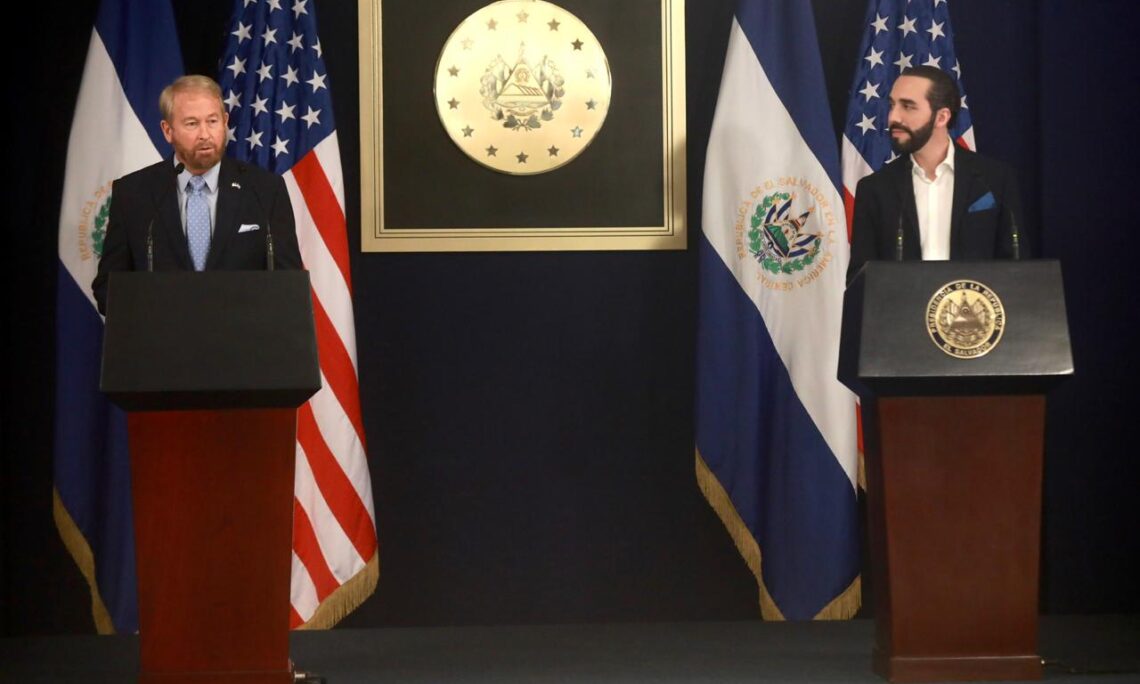 Courtesy of the U.S. Embassy in El Salvador
Courtesy of the U.S. Embassy in El Salvador
After Bukele’s Landslide Legislative Victory, the U.S. Must Reinvigorate its Commitment to El Salvador’s Democracy
Preliminary results from El Salvador’s February 28, 2021, legislative elections indicate that Nuevas Ideas, the party of El Salvador’s populist president, Nayib Bukele, has secured a supermajority in parliament (56 out of 84 seats). While Bukele has enjoyed unprecedented popularity and presided over several positive developments in El Salvador, his presidency has also displayed troubling signs of authoritarian drift. Bukele has violated the separation of powers, strengthened the police state, and reinforced a political climate of polarization, with deadly consequences. Nuevas Ideas’ latest legislative win will enable Bukele to further consolidate power and continue along an authoritarian path. El Salvador and its hemispheric allies must work together to defend democracy in Central America.
Bukele’s Rise to Power
Nayib Bukele first won the presidency in 2019 as an outsider to the political establishment. His emphasis on fighting corruption and fresh millennial image appealed to a Salvadoran public weary from years of scandal and economic insecurity under the country’s two-party system. He is wildly popular—enjoying approval ratings around 90%— and has cultivated an accessible public persona, using Twitter to communicate with constituents and sporting leather jackets and baseball caps instead of suits and ties.
Bukele has also presided over several positive socioeconomic developments in El Salvador during his tenure. For example, he has pointed to his Territorial Control Plan policing program to explain a drastic drop in El Salvador’s homicide rate from the beginning of his term to the present. His government has also emphasized its role in overseeing a dramatic reduction in emigration from El Salvador.*
Bukele’s Authoritarian Drift
Accompanying Bukele’s popularity and claims of success are threats to the integrity of El Salvador’s democracy. Under his leadership, the military and police have taken on an increasingly political role. For example, police forces spurred on by incendiary tweets from Bukele used the banner of COVID-19 lockdown violations to issue hundreds of arbitrary arrests.
Bukele has also refused to respect legislative and judicial independence. When El Salvador’s Legislative Assembly hesitated to approve a Bukele-backed security loan, Bukele stormed parliament with military forces. When COVID-19-related detentions were deemed unconstitutional by the Supreme Court, Bukele refused to comply, tweeting that “Five [justices of the constitutional court] won’t decide the deaths of hundreds of thousands of Salvadorans.”
Further, Bukele has propagated a populist rhetoric, expressing vitriol toward the media and opposition parties. For example, he manufactured defamatory lawsuits against investigative news outlets and canceled government contracts with publishers reporting unfavorably on his presidency. Earlier this year, two opposition party activists were killed and several others injured by agents of the state. While Bukele was not directly implicated in the incident, he refused to condemn the attack.
El Salvador’s Democracy is at a Critical Juncture: The U.S. Must Act
A supermajority in parliament will allow Bukele to pass legislation, appoint high offices, and amend the constitution without opposition support, which increases the likelihood of democratic backsliding. In the face of this threat, the U.S. must demonstrate its commitment to supporting Salvadoran democracy.
Fortunately, the U.S. has already taken some steps in this direction: Biden has made the Northern Triangle a key component of his Latin America agenda, Congress has offered bipartisan rebukes of Bukele’s power abuses, and U.S. officials have withdrawn military aid to El Salvador, citing Bukele’s failure to respect his country’s democracy.
Other actions the U.S. should take to support Salvadoran democracy include:
Diplomacy: While President Biden was right to deny Bukele a high-level meeting in Washington earlier this year, he must not disengage from the Salvadoran regime.
- Given delays in ambassadorial appointments across the board, it is unrealistic to expect that the Biden administration should or will prioritize El Salvador over other countries. In this vein, as embassy staff wait for Biden to name an ambassador, they should host staff-level talks with their Salvadoran counterparts to build trust and demonstrate U.S. commitment to the country.
- The U.S. ambassador and embassy staff should partner with non-state actors—including civil society, activists, and faith leaders—to strengthen El Salvador’s democracy institutionally.
- U.S. diplomats in El Salvador should signal to Bukele that higher-level diplomatic exchanges will be contingent upon his government’s good behavior.
Combat Corruption and Impunity: The U.S. must make anti-corruption efforts central to its engagement with Bukele’s government.
- The U.S. must effectively and actively use the Engel List and Global Magnitsky Act to apply targeted sanctions to corrupt Salvadoran officials.
- El Salvador’s OAS-backed anti-corruption body, CICIES, is not independent from the executive branch. The U.S. should help broker a deal between the UN and the Salvadoran presidency (akin to a previous UN-Guatemala agreement) to separate CICIES from government control.
- The U.S. should provide financial support and training for local AGs, prosecutors, and judges (an approach supported by Biden LAC advisor Juan González and former ambassadors) instead of directing aid dollars toward police training, which could bolster Bukele’s mano dura approach.
* Bukele’s opponents have contested his claims to success. Most notably, the well-reputed opposition newspaper, El Faro, has reported that the source of El Salvador’s depressed homicide rate is not Bukele’s Territorial Control Plan but rather a secret truce between the government and MS-13. According to documents obtained by El Faro, officials in Bukele’s administration met with gang leadership, offering them perks in prison in exchange for a pledge to decrease homicides and support Nuevas Ideas. Bukele, who denies El Faro’s allegations, had previously promised not to engage gang members.





